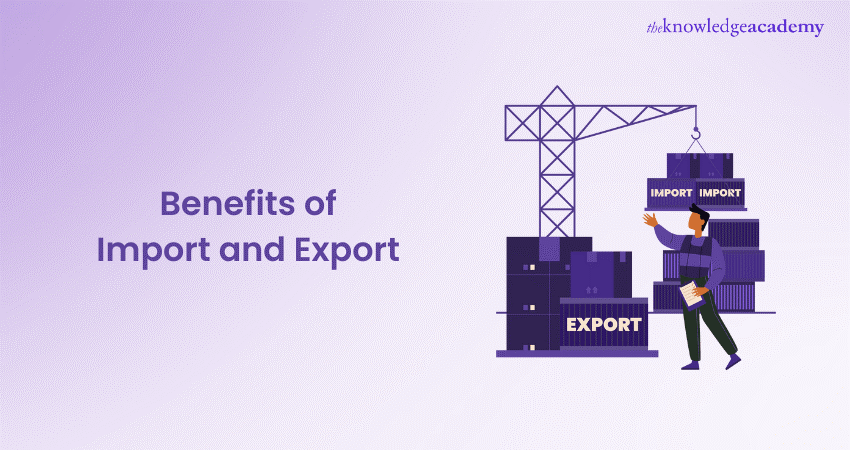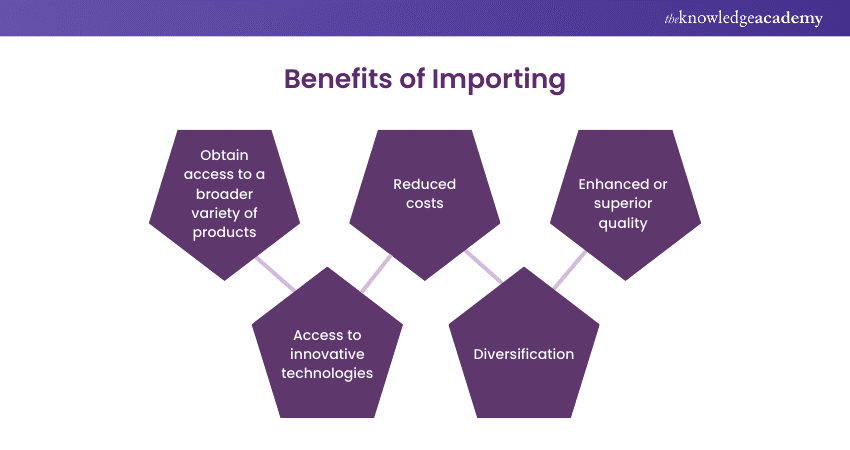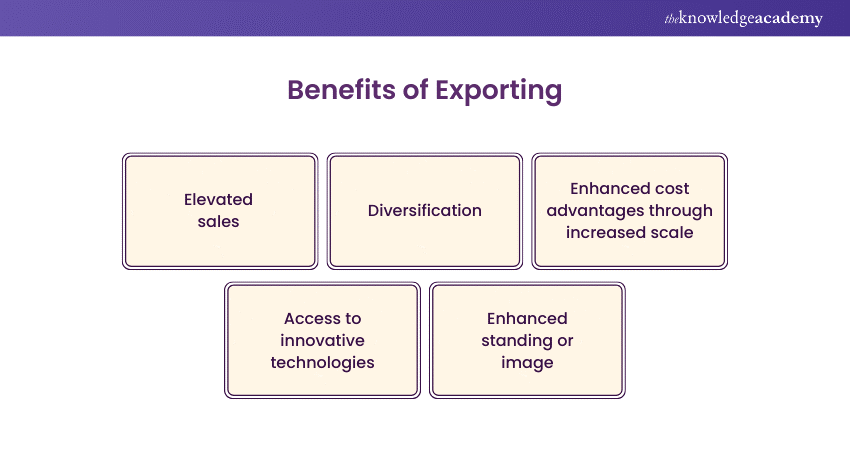We may not have the course you’re looking for. If you enquire or give us a call on +60 1800812339 and speak to our training experts, we may still be able to help with your training requirements.
Training Outcomes Within Your Budget!
We ensure quality, budget-alignment, and timely delivery by our expert instructors.

International Trade is not only a source of income but also a way of improving the quality of life for many people. There are many Benefits of Import and Export for both individuals and countries. Importing allows consumers to access a broader variety of goods and services at significantly lower prices, while Exporting creates opportunities for producers to expand their markets and increase their profits. Further read this blog to explore the Benefits of Import and Export and how they contribute to the world's economic, social, and environmental development.
Table of Contents
1) Benefits of Importing
2) Benefits of Exporting
3) Why is Importing and Exporting goods Important?
4) Conclusion
Benefits of Importing
International Trade, particularly Importing goods, brings many advantages for businesses and economies. Here are five key benefits associated with Importing:

1) Obtain access to a broader variety of products
Importing stands as a key driver of diversity in product availability. Consumers experience the advantage of accessing various goods from global sources, introducing them to unique items often absent in local markets. For businesses, Importing becomes a strategic avenue to expand product offerings, aligning with diverse consumer preferences.
This broader selection meets the demands of a heterogeneous customer base and positions businesses favourably in competitive markets. As a result, it enhances its appeal by providing exclusive or specialised products that might not be achievable through domestic production alone.
2) Reduced costs
Importing proves advantageous for businesses seeking cost savings. This is particularly evident when specific products can be produced more affordably in another country, owing to lower labour costs, abundant raw materials, or specialised production capabilities.
By Importing these cost-effective products, businesses effectively lower their production expenses, enhancing overall cost efficiency. This strategic approach supports economic viability and allows businesses to allocate resources more effectively. This, in turn, contributes to improved competitiveness in the global marketplace.
3) Enhanced or superior quality
Certain nations excel in crafting goods of exceptional quality, whether through superior craftsmanship, advanced technologies, or unique expertise. By Importing such products, businesses and consumers access premium options that may surpass those locally available.
This elevates the quality of goods in the market and introduces innovation and expertise that contribute to the overall enhancement of product offerings. Importing high-quality products is a strategic choice for those seeking to provide superior options and stay competitive in the global marketplace.
4) Access to innovative technologies
Importing facilitates the exchange of cutting-edge technologies between nations, providing businesses with a strategic advantage. Companies enhance operational efficiency by integrating advanced technologies and processes from foreign markets, fostering innovation within their domestic industries.
This dynamic transfer of knowledge not only elevates the competitiveness of businesses but also contributes to the overall progress and advancement of domestic industrial landscapes. Embracing innovations through Importing catalyses growth. Moreover, it enables businesses to stay ahead of technological evolution and maintain a dynamic edge in the global marketplace.
5) Diversification
Importing is a crucial driver of economic diversification, expanding product choices and supply sources. Overreliance on a single supplier or domestic production exposes businesses and economies to vulnerabilities during unexpected natural disasters or economic downturns.
Diversification through Importing enhances resilience by mitigating risks associated with geopolitical issues and unforeseen circumstances. It ensures a more robust and adaptable economic structure, shielding against disruptions and fostering stability in the face of external shocks. This strategic diversification strategy remains instrumental in navigating uncertainties and sustaining economic vitality on a global scale.

Benefits of Exporting
Exporting, a cornerstone of International Trade, propels businesses into a realm of unparalleled advantages, shaping their trajectory toward growth, competitiveness, and sustained success. Here's how:

1) Elevated sales
Expanding into global markets is a transformative journey for businesses. It helps unlock access to diverse customer bases and fuels elevated sales and revenue. The international stage becomes an expansive canvas, allowing organisations to showcase their offerings to a wider audience.
This exposure not only fosters substantial growth but also positions companies for success on an international scale, an opportunity often constrained within the confines of a domestic market. The inherent advantage lies in the ability to transcend geographical limitations, tap into new markets, and establish a global footprint that propels the business toward sustained prosperity.
2) Diversification
Exporting provides a strategic edge through market diversification, shielding businesses from the vulnerabilities of over-reliance on the domestic market. The risks of economic fluctuations and shifts in consumer behaviour are mitigated as companies extend their operations across diverse global markets.
This diversification acts as a safeguard, not only addressing market-specific challenges but also reinforcing the overarching resilience of the business. By navigating varied markets, companies cultivate adaptability, ensuring their sustainability amidst dynamic economic landscapes and positioning themselves as agile players capable of weathering unforeseen challenges.
3) Enhanced cost advantages through increased scale
Venturing into global markets necessitates a substantial upswing in production volumes. This operational scaling induces a reduction in per-unit costs, a critical factor in enhancing the global competitiveness of products. Businesses strategically involved in Exporting capitalise on these cost efficiencies.
Thus, they position their offerings as more compelling options in the international arena. This resultant cost advantage doesn't merely bolster profit margins; it becomes a pivotal element in carving out a distinctive and formidable competitive edge for businesses navigating the complexities of the global marketplace.
4) Access to innovative technologies
Engaging in global markets provides support to businesses as they immerse themselves in a diverse landscape of technologies and innovative methodologies. Collaboration with international partners or catering to a varied clientele often demands the assimilation of cutting-edge technologies.
This exposure acts as a catalyst, propelling a company's technological capabilities to new heights. The resultant innovation not only resonates within the confines of domestic operations but radiates globally. This helps position the business as a dynamic player at the forefront of technological advancements on the international stage.
5) Enhanced standing or image
The successful exploration of global markets boosts sales and fortifies a company's standing, consolidating its image in the business realm. Acknowledgement as an Exporter elevates reputation and brand image, acting as a potent testament to the ability to compete globally.
This positive perception resonates with customers, investors, and potential partners. Thus, it unlocks avenues for fresh opportunities and strategic collaborations. The ripple effect extends beyond immediate financial gains, positioning the business as a credible and competitive player on the global stage.
Enhance your knowledge of the current trends and policies with our Industry Training!
Why is Importing and Exporting goods Important?
When a business expands internationally, various factors come into play, influencing its success. Engaging in the Import and Export of goods forms the nucleus of thriving enterprises and contributes to the growth and expansion of national economies.
Each country possesses unique resources, some abundant and others deficient, for overall economic development. For instance, while some nations boast rich deposits of minerals, precious metals, or fossil fuels, others grapple with shortages. Disparities also exist in the development of educational systems and infrastructures.
International Trade, marked by Exporting surplus and Importing scarce resources, propels economic development. The significance of Importing and Exporting extends beyond corporate realms, benefiting individual consumers who gain access to products or components not locally available but accessible through online purchases from foreign businesses.
Do you want to learn more about Import and Export? Sign up now for our Importing and Exporting Masterclass!
Conclusion
In conclusion, the Benefits of Import and Export extend far beyond individual businesses, shaping global commerce. Embracing these advantages not only propels economic growth but also fosters collaboration and innovation. So, leverage the advantages of Import and Export to enhance economic vitality and foster international cooperation.
Enhance your knowledge about managing Supply Chain – sign up now for our Supply Chain Management Training!
Frequently Asked Questions

Engaging in Import and Export activities fosters economic growth by expanding market reach, encouraging specialisation, and promoting competition. It allows nations to access diverse resources, encourages innovation, and creates employment opportunities, contributing to a dynamic and interconnected global economy.

Absolutely, small businesses can gain substantial advantages from International Trade. Engaging in importing allows access to diverse and cost-effective raw materials while exporting opens new markets, enhancing growth opportunities. It fosters competitiveness, increases revenue streams, and enables collaboration, contributing significantly to the overall success and resilience of small enterprises.

The Knowledge Academy takes global learning to new heights, offering over 30,000 online courses across 490+ locations in 220 countries. This expansive reach ensures accessibility and convenience for learners worldwide.
Alongside our diverse Online Course Catalogue, encompassing 17 major categories, we go the extra mile by providing a plethora of free educational Online Resources like News updates, Blogs, videos, webinars, and interview questions. Tailoring learning experiences further, professionals can maximise value with customisable Course Bundles of TKA.

The Knowledge Academy’s Knowledge Pass, a prepaid voucher, adds another layer of flexibility, allowing course bookings over a 12-month period. Join us on a journey where education knows no bounds.

The Knowledge Academy offers various Industry courses, including Importing and Exporting Masterclass, Logistics Management Training, and Export and Trade Compliance Training. These courses cater to different skill levels, providing comprehensive insights into Logistics and its Importance.
Our Business Skills blogs covers a range of topics related to Logistics, offering valuable resources, best practices, and industry insights. Whether you are a beginner or looking to advance your Import and Export skills, The Knowledge Academy's diverse courses and informative blogs have you covered.
Upcoming Batches & Dates
Date








 Top Rated Course
Top Rated Course


 If you wish to make any changes to your course, please
If you wish to make any changes to your course, please


